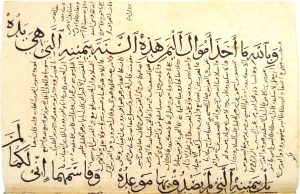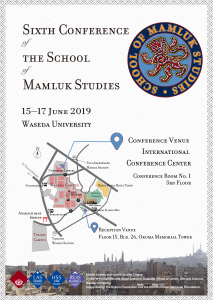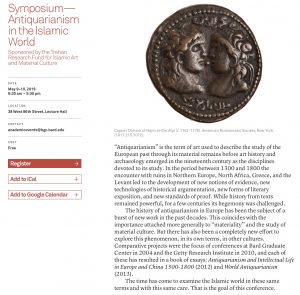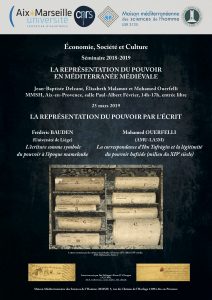Agenda
-
sam15Juin2019lun17Juin2019Waseda University, Tokyo
Sixth Conference of the School of Mamlūk Studies
Prof. Frédéric Bauden will read a paper entitled "Brokering power in Mecca: Rasulid-Mamluk diplomatic exchanges about the Meccan Sharifate". The paper is part of a panel entitled "The Versatile Approach to the Diplomatic Dialogue" and organized by Dr. Alessandro Rizzo (post- doc, CSIC, Barcelona, Liège University).
-
mar21Mai201918h15-19h30Ludwig-Maximilians-Universitäts München, Universitätshauptgebäude Geschwister-Scholl-Platz 1, Hörsaal M 014
Brokering power in Mecca: Rasulid-Mamluk diplomatic exchanges about the Meccan Sharifate
 Lecture by Prof. Frédéric Bauden.
Lecture by Prof. Frédéric Bauden.If the control of Mecca (and of the Hijaz in general) represented for the Mamluks a source of legitimation (notably by guaranteeing the yearly organization of the pilgrimage), it appears that their grip on the Holy City was characterized as seasonal. Once the pilgrimage ended, the Sharifs enjoyed political autonomy. In the early ninth/fifteenth c., the Sharif Ḥasan b. ʿAjlān (r. 797–826/1395–1423) was an emblematic example of the power that his family availed itself of. Ḥasan particularly took advantage of the increase in trade between the Indian Ocean and the Mediterranean Sea that passed through the Hijaz to extend his power over the whole region. His exactions from pilgrims and merchants deeply annoyed both the Mamluk and the Rasulid sultans who tried to affect the situation by manipulating the local politics in Mecca.
Over the last decade, John Meloy and Eric Vallet have addressed numerous issues linked to Ḥasan’s reign, respectively from the point of view of the Mamluks and the Rasulids. Their studies were largely based on literary sources, with a limited use of documents. In this paper, I propose to tackle the events that took place between the years 816–20/1413–7, a period during which Ḥasan was briefly replaced by his nephew Rumaytha (818/1416), through the lens of documents. Apart from copies of letters preserved in Ibn Ḥijja’s Qahwat al-inshāʾ, I will also consider a unique Rasulid original letter dated 817/1415 reused as scrap paper by al-Maqrīzī. These documents offer a different insight into the way both sultans tried to face the threat posed by Ḥasan by means of diplomacy. -
jeu09Mai2019ven10Mai2019
-
lun25Mar201914h00-17h00Aix-en-Provence, MMSH, salle Paul-Albert Février
L’écriture comme symbole du pouvoir à l’époque mamelouke




